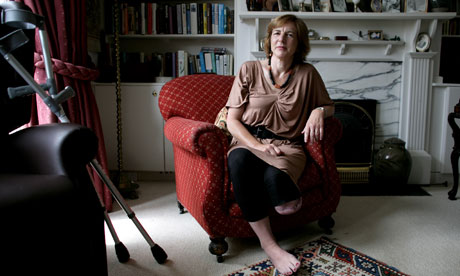
On my way back from an appointment at the hospital where I was being treated for a rare giant cell tumour in my left foot, my phone rang. It was my publisher saying that she'd found an image of a rather lovely pair of feet to go on the cover of my first novel. They were nothing at all to do with the book but, she thought, they somehow caught the spirit of it.
Three major operations on my foot between 2006 and 2008, including the insertion of bits of my hip, fibula, special cement, screws and plates, and months in plaster, had left it tumour-free but stiff and very painful. So the feet on the cover, which would be smiling if feet could smile, filled me with delight.
The picture has come to symbolise a period of calm and happiness; I loved my work as a lecturer in clinical and biomedical ethics, my husband was enjoying his new job, my teenage children were flourishing. But in February, a bone scan showed up something odd in my left shin. My surgeon didn't look particularly worried; giant cell tumours don't spread to other bones. He sent me for an x-ray and looked a little more concerned. Then, the week I went for an MRI scan and biopsy, my husband was suddenly and ignominiously sacked.
Ten days later, my surgeon rang and carefully broke the news that, against all expectations, the lesions in my shin were malignant giant cell tumours, and the only effective treatment would be amputation, below the knee. I remember joking that the situation wasn't all bad – at least if I got a blue badge, parking would be less of a nightmare. But when he hung up, I put my head on my desk and wept, overcome with an overwhelming feeling of sadness and disappointment. For years, I'd managed to keep going when every step had felt like walking on a broken foot. For years each time I'd had a scan I'd fought to control my terror that there would be evidence of the disease in my lungs. And all that had been for nothing.
My immediate concern was how to break the news. My husband was relieved; he'd been frightened I was going to tell him I had only weeks to live. The upside of his unemployment, he concluded, was that he would be around to look after me. My children appeared to buy my assertion that amputation was not the end of the world. But several of my friends cried. My quips about saving money on a quarter-leg wax, or going for a shark's mouth tattoo on my stump, didn't seem to convince them.
Yet I was oddly calm when I went for the operation, which would make me one of the 52,000 people in the UK who are lower limb amputees – even when, as I waited in my hideous backless gown to be collected for theatre, they cancelled and rescheduled for the following day. Provided I didn't picture my leg being carried out of the operating theatre in a metal dish, it all felt just about bearable.
I woke up attached to a plethora of tubes. My brain was adamant that my leg was still there and, however hard I concentrated, I couldn't persuade it to re-think. If I twiddled my non-existent toes, I was sure I could see them shift under the bedclothes. As the epidural wore off, it felt like someone had tied a wide piece of elastic around the muscle at the back of my knee, attached the elastic to a slow-moving HGV, and me to a stationary object, and set off.
All that seems a very long time ago. There have been some dark times: when the wound opened up and turned into an infected swamp, I despaired it would ever heal. The sensations in my phantom limb can be intolerable. I feel sad when it hits me that not a day will go by without me having to think about my leg, that I'll never be able to walk barefoot on a beach, that I'll never be able to swim without being conscious of how different I look. I still find myself trying to take off my right shoe with my missing left foot.
But mostly, I feel fine. If I find myself wistfully remembering the good times I shared with my leg – trekking in Bhutan, dancing the night away in Colombo, walking through the bush in The Gambia, I remind myself of the pain and uncertainty I lived with for so many years. I remind myself that there is very little I can't do and that most of the things I love doing, such as spending time with my family and friends, reading, writing, seeing plays and films or listening to music, are perfectly manageable with a stump, and eventually, a prosthetic leg. Most of all, I remind myself that, for now at least, I'm "cured".
Now that I'm back at work and looking forward to being measured for a prosthesis, I can see there have undoubtedly been gains. I'm sure that losing my leg has brought us closer as a family. I've been touched and overwhelmed by the kindness of my family, friends, colleagues and students. I've learned how to blog. I've seen the NHS at its very worst and its very best and amassed huge amounts of material for next year's clinical ethics lectures; I've written an afternoon radio play pitch for an amputation comedy. And at my rehabilitation centre, with its wonderful staff and friendly volunteers, a mug of tea is only 30p.
• Sue Eckstein is a lecturer in clinical and biomedical ethics at Brighton and Sussex Medical School. Her novel, The Cloths of Heaven, is published by Myriad Editions, price £7.99.

